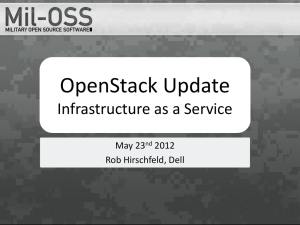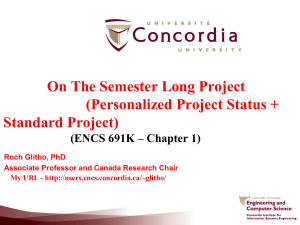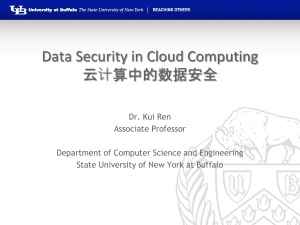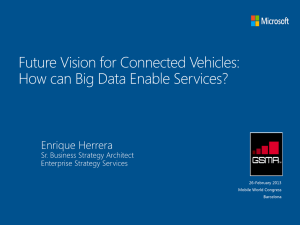CloudCourseEssayTopics2013-11-9
advertisement
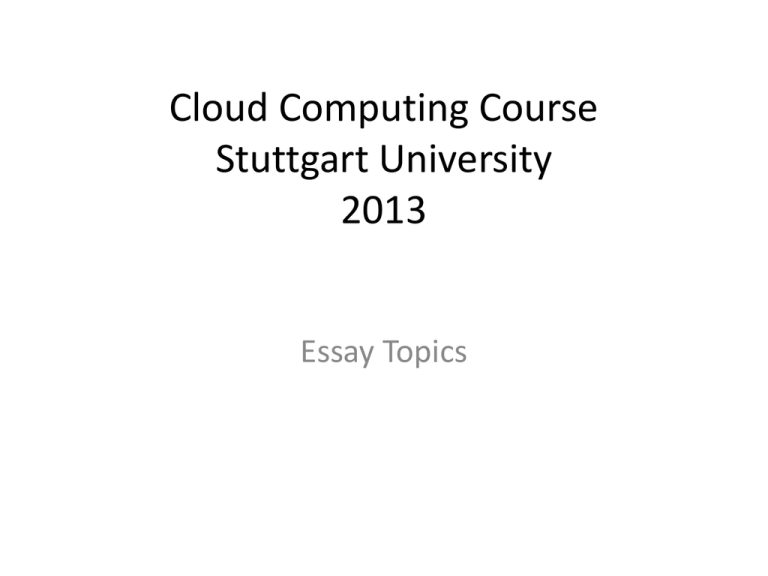
Cloud Computing Course Stuttgart University 2013 Essay Topics Essay Topics Write short essay (8-10 pages) on one of the questions below, with 30 minutes exam • • • • . Breiter: Describe the Common Cloud Management Platform Reference Architecture (CCMP RA). Give a brief overview of the CCMP RA - what are the technical workproducts (TWPs) which the RA contains. Briefly describe the TWPs. Highlight some examples of Cloud Services which can be managed by the CCMP RA. Schlatter: With Hybrid Clouds the question is no longer "To Cloud or not to Cloud", i.e., the question is no longer only what workloads are suitable, or not suitable for the Cloud. Instead, enterprises must solve multidimensional optimization problems: what should they build and host themselves, in traditional IT or in onpremise private cloud environments, and what should they get from which of the various off-premise IaaS, PaaS, or SaaS cloud service providers. – Describe an imaginary example of that optimization problem: • What is the goal function, i.e., what is to be achieved? What should be maximized, what should be minimized? Give examples of both quantitative and qualitative measures. • What are the constraints? Think of examples of non-functional requirements that may have to be met in a given situation, and that may limit the degrees of freedom. • What are the decision variables, i.e., what are the Points-of-Variability, what needs to be decided? Give examples of the cloud service characteristics that need to be taken into account. Kloeckner: Discuss the importance of multi-tenancy for XaaS, and the various ways of achieving it in the layers from Virtualization to Middleware. Particular focus on DB Kloeckner: Relaxed consistency – discuss the various approaches described in the papers of Hohpe, Vogels and others. Advantages, disadvantages. Discuss one implementation in detail. Essay Topics continued • • • • • • • • Kloeckner: Discuss the properties of content-centric applications with an in-depth description of Hadoop and its applications, compare to Google Kloeckner: In-depth description and analysis of MS Azure Kloeckner: Discussion of warehouse scale computing, pros and cons of commodity infrastructure - Barroso/Hoelzl Kloeckner – Discuss the main characteristics of Cloud Security Kloeckner – Discuss the main considerations for performance of clouds Kloeckner – Discuss the major elements of cloud economics (including references like ‘Above the Clouds’ Breh - What are the approaches to adapt the cloud computing concepts ? – Discuss the approaches considering cultural and organizational aspects? – What are the potential integration points of cloud processes into an enterprise? – Why are they important? Breh: Reference Architectures – – Why does a System Integrator or IT company like IBM need a Reference Architecture ? What is the impact of having no Reference Architecture in particular in a growing technology area? – Architecture building Methodologies often are separated into phases. Describe main purpose of the first phase that is described as 'Understanding the Client'. What are potential impacts and risks of skipping this phase? – Essay Topics continued • • • Behrendt: Imagine you're a lead architect, responsible for a software development team in an enterprise. Your enterprise operates in the "traditional" way from both a software development and IT operations perspective. – You're asked to develop a proposal for changing that towards a cloud-based devOps approach, in collaboration with a peer on the operations side. – Discuss steps you would take on this journey, including the associated architecture, rationale for the stages in your roadmap and expected benefits & challenges for both the development and operations side. Address both technical, process and organizational changes you would take. Sippli: OpenStack is the emerging cloud operating system to provide Infrastructure, Network and Storage-As-A-Service via prescriptive, well-defined APIs. Describe the overall OpenStack architecture, while highlighting concrete examples of OpenStack‘s design tenets. Discuss characteristics of a good API in general and compare the OpenStack APIs against these characteristics. Sippli: OpenStack is the emerging cloud operating system to provide Infrastructure, Network and Storage-As-A-Service via prescriptive, well-defined APIs. Describe the overall OpenStack architecture, while highlighting concrete examples of OpenStack‘s design tenets. Discuss the main reasons of OpenStack‘s success. Highlight the projects that will grow the most in the next 2 years according to your opinion, and share your reasoning. Essay Topics continued • • • Rodet: "Your company has a home-made ordering software, allowing creating orders, notifying of new orders and approval by the responsible managers, and displaying for each team the own order history with items and amounts. Your team is requested to provide a mobile app for that application which provides a REST API for accessing all above functionality. Please first describe how you would organize the team and the design process to design and implement that app. Then describe an initial set of personas and their related use cases to begin with. Provide an description of the design tooling you would use, then what functionalities would be surfaced by the app and how would be navigation organized. Show how that navigation looks like through a mockup, so you can make a first design validation with sample users and stakeholders.” Sippli/Lumpp: "Design a HA/DR solution for a cloud offering. State your viewpoint (CSC or CSP), define potential workload to be run in your offering, adapt your solution accordingly. Describe required components and technologies. Outline potential outages and how your solution protects against such." Noll/Brolik: Software Defined Storage – – – – – What are the requirements/goals for consumers and for providers of storage services in a cloud environment? What are the benefits of storage virtualization and what are the pre-requisites of using storage virtualization? Describe the main functional areas needed for storage management in cloud environments. Describe the tasks involved in storage management, which are mostly manual today, that could be automated, and how. Discuss the prerequesites which need to be in place in order to implement a SDS solution. Essay Topics continued • Berg: What do you believe is the most influential technology trend that is driving and enabling the use of DevOps practices and tools and why? • Berg: What do you think the world of enterprise software delivery will look like in ten to fifteen years (take into account practices, technology, and user experience)? • Berg: How can you make DevOps “real” as part of your course work and projects? Essay Topics continued • Schulze: Enterprise Level Private Clouds – Describe the use cases to be considered for an enterprise-level cloud implementation like SCE+. – Evaluate how these use cases may be realized with OpenStack in future and where OpenStack still requires enhancements to cover them. – Describe the deployment topology of a globally deployed cloud like SCE+. Essay Topics continued • Breiter: Software Defined Environment (SDE) – Reason on Declarative vs. Imperative Models for Patterns– when to use what? Define and Describe examples – Come up with your example of of the Base Model for SDS, SDN and SDC – reason about the right modeling granularity and describe your architectural decisions – How do we manage Service Level Agreements and Non Functional Requirements in SDE • How do we model and implement the autonomic behaviour of the SDE beyond deployment? • What are the implications on the TOSCA standard? For example: is there a need for standardization of eventing, signalling?


